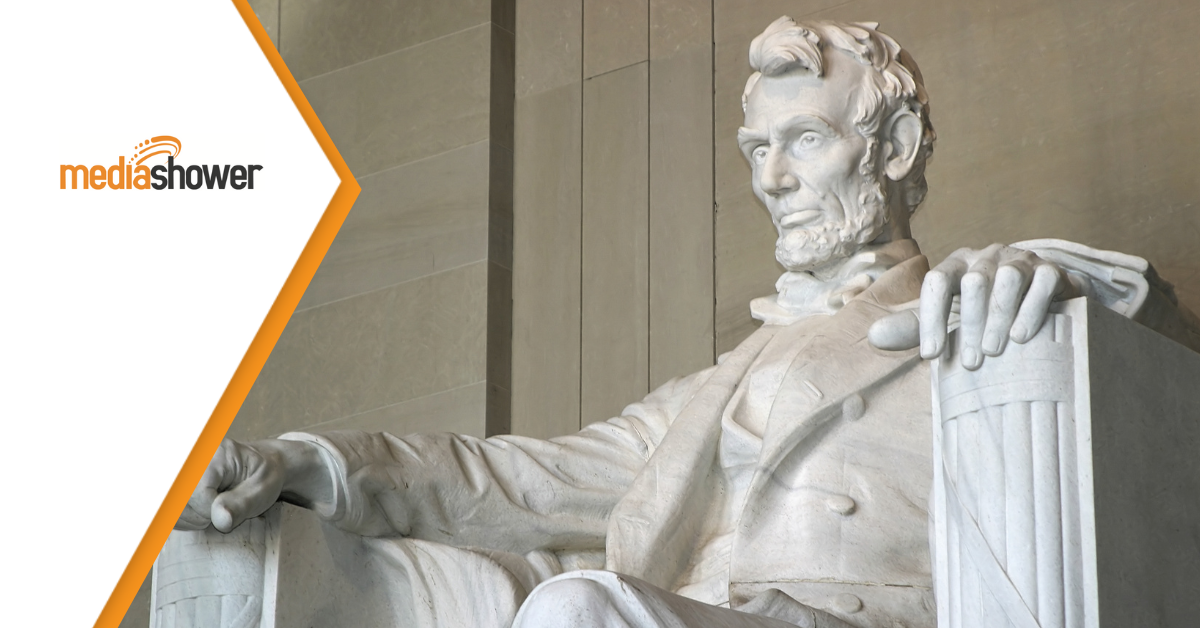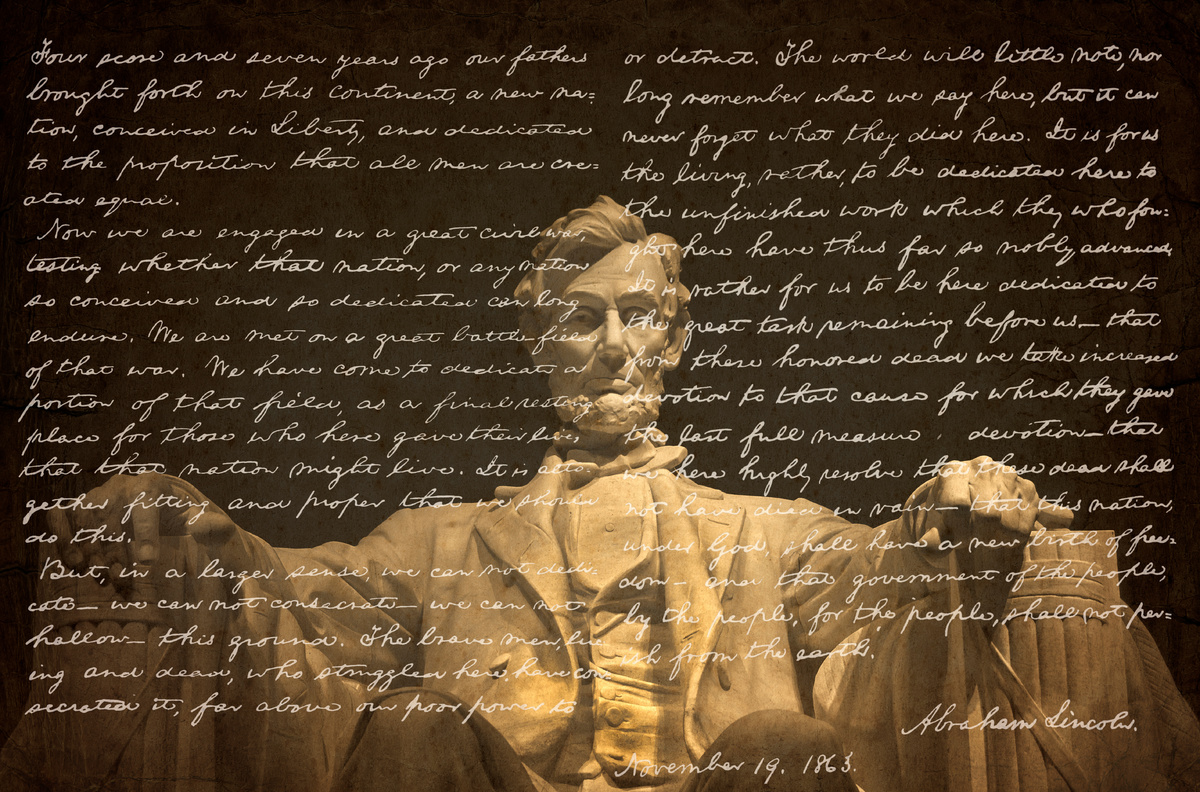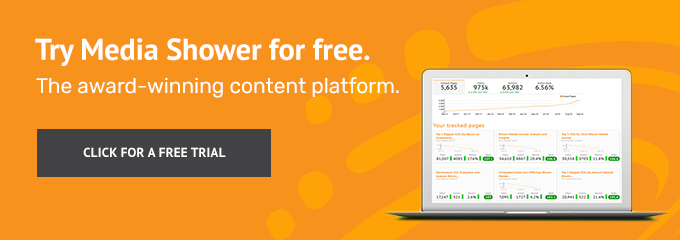
TLDR: Lincoln’s Gettysburg Address may have been written on the train as he traveled there, but it’s had staying power few presidential speeches have ever experienced. More than 150 years later, people recite and study this iconic speech because it’s powerful and memorable.
So What? As communicators, we can learn from the lessons of the Gettysburg Address to infuse our own speeches, letters, and communication with the same kind of power and resonance.

Abraham Lincoln’s Gettysburg Address was one of the shortest presidential speeches in history, at only around 250 words and about two-and-a-half minutes of speaking time. Despite (or maybe because of) its brevity, it has been remembered for over 150 years. It’s recited by schoolchildren and studied by scholars who seek to discover its staying power and importance.
As communicators, we want to learn the lessons of this iconic speech ourselves so we might bring more staying power to our own speeches and communications. A deep dive into the depths of the address can yield valuable insights any communicator can use to his or her advantage.
What Made the Gettysburg Address Such an Important Speech?
A Pivotal Time
The Gettysburg Address came at a pivotal time during the Civil War. While the losses were huge, the Battle of Gettysburg marked the first major battle won by the Union Army.
By dedicating the field outside of Gettysburg as a cemetery for fallen soldiers to receive proper burials, Lincoln saw a chance to press his newly-gained advantage and remind both sides that freedom and equality were important for all people in America regardless of their races.
A Higher Purpose
At the same time, Lincoln pressed the case for renewed unity among the American people rather than the division over slavery that had initially caused the war. In a sense, the war was not about slavery, but the ability of a severely divided country to continue the world’s greatest freedom experiment together.
By appealing to the ideals held in common by Americans on both sides of the conflict (freedom, democracy, and equality), Lincoln could transcend the somberness of the occasion and refocus American priorities. This would prove important as the South fell apart and the war ended two years later.
What Has Allowed the Speech to Stand the Test of Time?
Brevity with Power
Lincoln used few words in his address, but every word counted. When the speech was delivered, some listeners were shocked when it ended after just two minutes. The main speaker of the day, Edward Everett, had just finished speaking (from memory) for two hours.
While Everett spoke for long minutes about funeral pyres, mournful processions, and orations of ancient Greece, Lincoln described the battlefield deaths as soldiers’ “last full measure of devotion.”
Edwards later wrote to Lincoln, “I wish that I could flatter myself that I had come as near to the central idea of the occasion in two hours as you did in two minutes.” The brevity of Lincoln’s speech only added to its power.

A Unique Situation
Lincoln was in a unique situation. A battlefield cemetery had never been dedicated before, and the country had yet to experience civil war. Lincoln drew attention to the uniqueness of the moment while he focused not on himself or a particular side of the conflict, but on the higher ideals of Americans.
Lincoln’s ability to respond with strong leadership to the uniqueness of the situation has helped this speech and his presidency stand the test of time. The Gettysburg Address was one example of Lincoln’s ability to hold competing priorities like ending slavery and preserving the Union and bringing them both to fruition.
What Important Takeaways Does the Address Offer?
Focus = Power
It wasn’t the brevity of Lincoln’s speech alone that made it a powerful piece of communication. It was the focus of the speech and the way it communicated principles that Lincoln and most Americans held dear. The more simple and focused you can make your communication, the more powerful it will be.
For written communication, a useful exercise might be to cut your word limit significantly, then ruthlessly cut out the fat. It might seem impossible at first, it can be done, and the result is almost always a more focused, powerful form of communication.
Appeal to Higher Purpose
Lincoln’s speech appealed to something bigger than himself and even bigger than the event he was there to announce and support. Lincoln’s speech went beyond politics and asked listeners (and later readers) to remember what they were fighting for.
“The brave men, living and dead, who struggled here, have consecrated it, far above our poor power to add or detract,” he wrote about the cemetery.
Lincoln and the Union Army fought for equality for everyone; for the unity of their country and for the preservation of democracy. That’s a higher purpose, and Lincoln’s reminder of those things was sorely needed during the war, a time when people tended to despair and lose sight of the objectives.
The Past and the Future
In his speech, Lincoln linked the past (the Constitution and the founding of America) and the future (truer equality and unity). Doing this put his speech in the context of history and gave it an important place.
In its proper context, the brief speech spoke volumes to a war-torn country that still had a long way to go before it found peace again. Without demeaning or condemning the Confederacy or making it an evil foil to the Union side, Lincoln transcended mere politics to show where America had been, where it was, and where it needed to go.
Where does your marketing need to go? Not sure? Media Shower can help, and you can try our award-winning platform for free.
